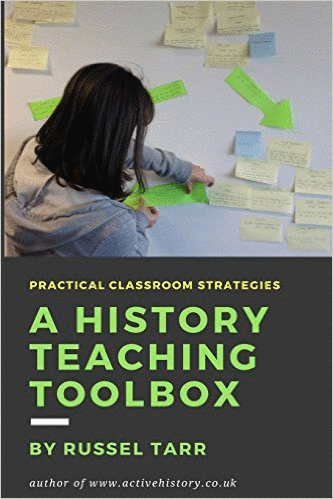Transform your history classroom
ActiveHistory provides educational, award-winning interactive simulations, decision-making games, self-marking quizzes, high-quality worksheets and detailed lesson plans for the school history classroom. All resources have been designed by full-time history teacher Russel Tarr.
An ActiveHistory subscription provides everything you need to construct and deliver a History course from start to finish for the entire 11-18 age range!
These consist not just of lesson plans, worksheets and teacher notes, but also multimedia lectures and interactive games and historical simulations ideal for remote learning and self-study.
SIGNUP
LOGIN
World History teaching resources for the high school classroom: lesson plans, worksheets, quizzes and simulation games for KS3, IGCSE, IB and A-Level teachers.
Using "The Apprentice" TV Show Format in the Classroom
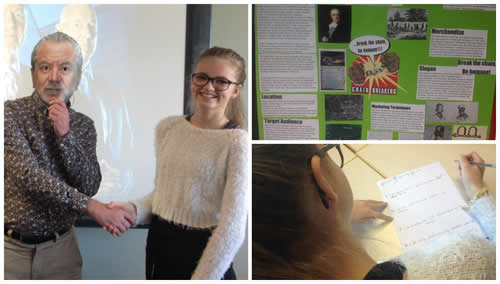
This study unit uses the format of the TV show "The Apprentice" to help students research and prioritise the methods used by the 19th Century Abolition Movement to outlaw the slave trade. Students are organised into teams, each one of which needs to produce a 'joined-up' campaign to abolish the slave trade. This includes choosing a target audience, a celebrity sponsor, merchandise and a publicity stunt. During the feedback phase their methods will be compared and contrasted with the actual techniques used at the time. The most impressive contributors go through to a grand final where they work with the other students to demonstrate their skills of research and presentation. After an overall winner is declared, all students are required to produce an individual project reflecting on why the slave trade was actually abolished.
The study unit is a real highlight of the Year 9 History course and is easily adaptable for other topics and curriculum areas. I provide the following outline so you can try it out for yourself. The timings are flexible: I spend considerable time on the topic but it can easily be compressed to take place over just a few hours in total.
Russel Tarr
Time |
Lesson overview |
1hr |
Introduction to the task
The class is introduced to the task and is arranged into teams of 4-5 people.
To randomise this (if necessary) use the ClassTools random name picker.
Students are shown a series of current-day brand-names, logos and slogans using a PowerPoint presentation.
For the remainder of the lesson (and ideally for homework) each team has to come up with:
(a) The name of their pressure group; (b) A logo and (c) A slogan.
|
2hrs |
Research and Preparation
Lesson time is now set aside for teams to get to work on their campaign.
All teams should start by deciding upon a target market for their campaign and be prepared to explain why they think this group will be able to help abolish the slave trade. The teacher should ensure as far as possible that each team has a different target market.
Once each team has identified its target market, they will need to decide how to organise the team to decide upon the remaining aspects of the presentation:
- Location for the campaign
- Merchandise
- Celebrity sponsor (based on a real-life personality from the period)
- Publicity stunt

At the end of this two-hour preparation period, each team should have arranged their ideas and images onto a large piece of coloured card ready for the boardroom meeting with “Lord Sugartrader”:




Taking it further:
The teacher could show the teams the series of images relating to life on the plantations (complete with captions). Each team should be allowed to nominate three of these images which they want to add into their campaign. The teacher should then print these off and give them to each team to develop their presentations further (they will be required to justify their choices during the boardroom meeting).
The teacher could also show each team different arguments provided by pro-slavery campaigners in favour of the slave trade. For each one, the team should be challenged to reflect on how they would respond to these arguments. |
2hrs |
The Boardroom Meeting
The teacher, in role as ‘Lord Sugartrader’ now proceeds to interview each team about their campaign. He starts by asking each team in turn about their pressure group name / logo / slogan and why they think it is effective. Other teams might be encouraged or instructed to make constructive criticisms about the work of other teams (to keep this positive, the question might be phrased as ‘What do you think is the most effective aspect of the logo/slogan designed by Team X?”).
At the end of this first round of questioning, the class should be shown some actual Abolitionist methods from the period and be invited to comment upon them in terms of their strengths and weaknesses.
This format is then repeated for the remaining aspects of the campaign (location, celebrity sponsor, merchandise, publicity stunt - using the appropriate parts from the presentation).
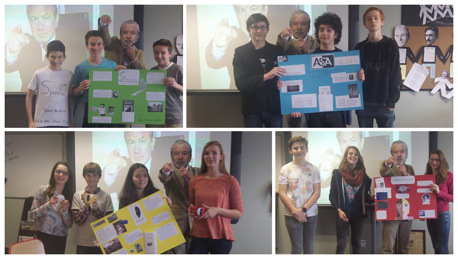
Taking it further
- As part of the feedback process at this stage, the teacher could ask each team leader to answer the question "If each member of the team could be described as a body part, how would you do this?". I have written a blogpost and provided a template for "What part of the body were you?" on my ClassTools Blog.
- At a relatively early stage, Lord Sugartrader may wish to 'fire' two people (either on the basis that they have not contributed much, or alternatively because they are clearly 'carrying' the team too heavily and the other members need to be pushed out of their comfort zone). These two people can become Lord Sugartrader's "eyes and ears" for the rest of the session and provide him with useful insights into how the teams are operating, as shown below:

Deciding upon the finalists
- At the end of this session, Lord Sugartrader will need to decide on the finalists.
- As far as possible, the teacher should aim to keep one person from each team to go through to the final (although this might not be appropriate and it may be that two people from one team become finalists, and none from another).
- To keep the process good-humoured the teacher should start by stressing the positive aspects of the whole team before picking one person out for particular praise and announcing that they are through to the final. It is up to the individual teacher to decide whether it is appropriate to explain why the remaining people are “Fired!”.
- Make it clear that the ‘Grand Final’ will take place next lesson.
|
1hr |
The Final
- At the start of the lesson, the finalists should stand up. They are then invited to nominate one person each in the class to form part of their new team.
- They then choose a second person, and so on, until there are just two people left in the class who have not been selected.
- These two people become Lord Sugartrader’s assistants: they are given a clipboard each and asked to come to the front of the class to await further instructions.
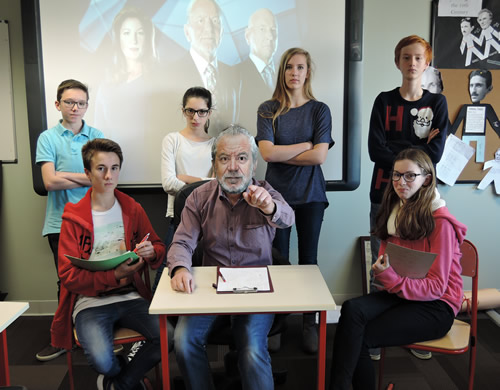
Part 1: Researching how the slave trade was actually abolished
- Each finalist is told what the next last task consists of: namely, they will be directed to two websites which provide a varied list of ways in which the slave trade was actually abolished.
- They will have 20 minutes to choose two of these which they think were overall the most effective. Lord Sugartrader’s assistants will be taking notes on how effectively each finalist approaches this time-restricted task.
- At the end of the allotted time, each finalist should nominate the two methods they have decided to research further and deliver their presentation on. They are then given a further 10 minutes to prepare their brief talk to the class about how and why this particular method was effective.
Part 2: Writing an anti-slavery poem
- In the next part of the final, the students are given the first few lines of the anti-slavery poem ‘The Anti-Slavery Alphabet’.
- This is a poem in which each letter of the alphabet refers to a different feature of the slave trade.
- Each finalist is then given another batch of the letters (e.g. G-K, L-P, Q-U, V-Z) and then has to produce the next part of the poem in this same format, using their knowledge from previous lessons to help them:
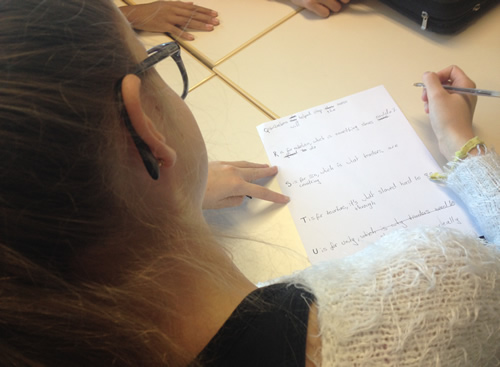
These are then read out to the class, and compared to the real poem.
In both stages of the feedback process in this session, it is the teacher’s role to ensure that the ‘assistants’ are encourged to provide feedback about the quality of teamwork that took place.
It is at the end of this process that Lord Sugartrader announces which student has been “hired” as the successful “Apprentice”.

|
1hr |
Individual Outcomes
It is important at the end of this process that all students produce an individual outcome to consolidate their knowledge. They can do this in one of two ways:
Option 1: Produce a Diamond9 diagram outlining the most important methods by which the slave trade was abolished.
Option 2: Students convert a timeline outlining the process by which the slave trade was abolished into an infographic focusing on one theme, event or individual described within it. A great example of a web project produced by one of my students during these lessons can be found here. Ambitious students might wish to produce a resource covering the entire period:
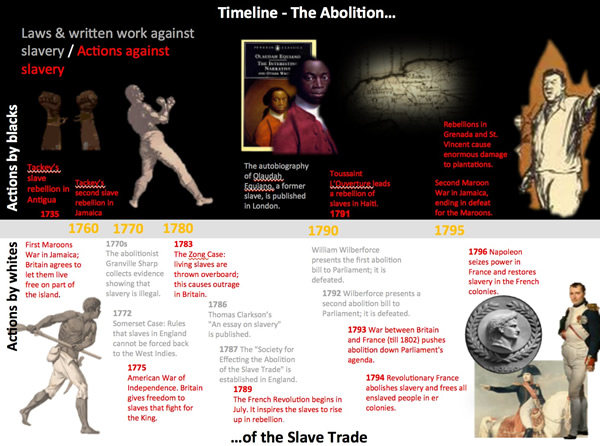
|

© 1998-2026 Russel Tarr, ActiveHistory.co.uk Limited (Reg. 6111680)
1 Torrin Drive, Shrewsbury, Shropshire, SY3 6AW, England
Privacy Policy | Contact















